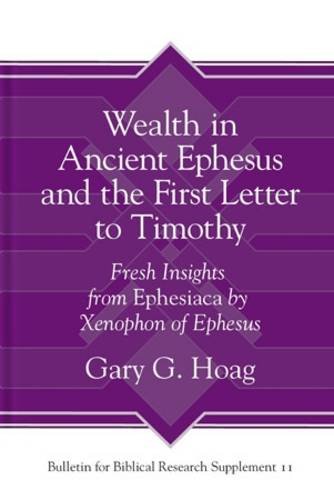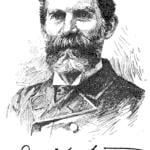Q10.BEN: Obviously the issue of slavery is a ethically difficult one for Christian scholars to discuss, and there have been recent treatments of the household codes and related passages such as the one you deal with in 1 Timothy, that in essence suggest that the writers of the NT, and perhaps especially those in the Pauline circle simply capitulated to the status quo, or even endorsed it, when it came to slavery (see e.g. Harrill’s book)? My response to that whole way of reading the NT is it fails to take into account a whole bunch of factors: 1) Christian writers had to begin with people where they were. Wealthy converts most often had domestic slaves, and a writer like Paul had to start with them where they were. They were not instantly de-socialized from the values of their society; 2) this sort of approach ignores the various levels of moral discourse when it comes to the households codes (e.g. Colossians is first order moral discourse, that is the opening gambit with an audience Paul did not convert). The differences we see between Colossians and Ephesians reflect the fact that Ephesians is a second salvo, a taking of the argument about the households codes further, and making the situation more Christian, even telling masters that they should serve their slaves in the same manner as the slaves have been serving; and 3) Philemon shows us what Paul would say, taking things yet another step further, to a close associate when it came to slavery, namely manumit the man as he is no longer a slave but rather a brother in Christ. What do you think of this analysis, and where exactly would you say the discussion is in 1 Timothy— is this first order advice given to Timothy to share with new converts?
A10.GARY: I think the author of 1 Timothy does not focus on cultural institutions like slavery because it was one of many social constructs that represents a way of living outside God’s design. In other words, NT authors could have written about a host of abuses, slavery being one of them. Any silence should not be understood as support for such issues.
In texts like Galatians 5:28, the Apostle Paul targets three big ones both clearly and concisely in saying: “There is neither Jew nor Gentile, neither slave nor free, nor is there male and female, for you are all one in Christ Jesus.” I read texts like this as stripping away the status distinctions that divide people horizontally and vertically in the social order and putting everyone on the same level before God. in the social order and putting everyone on the same level before God.
Once all are on the same level, the author of 1 Timothy chooses not to address the societal vices but speak to people where they were at, using your language, and I believe my fresh rendering of the last phrase of 1 Tim 6:2a (BBRS 11, p. 158), makes clear that the reason Christian slaves and Christian masters should treat each other different from cultural norms for people with those ascribed labels, is because they are both believers, and thus, both recipients of God’s divine beneficence.
Why behave this way, which would have been radically different from the culture? The text itself in 1 Tim 6:1 gives the answer: “so that the name of God and the teaching may not be blasphemed.”
Would Paul suggest masters who come to faith free their slaves? I think so based on his letter to Philemon. Interestingly, I think he leaves that along with all the other vices as the job of the Spirit in the life of the master, just like the slave who comes to faith must shift their focus from running away to glorifying God. What we do see in Ephesians 6:5-9 and Colossians 3:22-4:1 is the relocate of the identity of the slave and the master from being linked to status in society to their relation to Christ, and then calls them to live differently because they belong to Christ.
This chapter for me plays a key role in 1 Tim scholarship because Bible translators have rendered the language of this disputed phrase in 1 Tim 6:2 in quite mixed manner based on the translator’s view of the source of beneficence (see examples in the social order and putting everyone on the same level before God.
Once all are on the same level, the author of 1 Timothy chooses not to address the societal vices but speak to people where they were at, using your language, and I believe my fresh rendering of the last phrase of 1 Tim 6:2a (BBRS 11, p. 158), makes clear that the reason Christian slaves and Christian masters should treat each other different from cultural norms for people with those ascribed labels, is because they are both believers, and thus, both recipients of God’s divine beneficence.
Why behave this way, which would have been radically different from the culture? The text itself in 1 Tim 6:1 gives the answer: “so that the name of God and the teaching may not be blasphemed.”
Would Paul suggest masters who come to faith free their slaves? I think so based on his letter to Philemon. Interestingly, I think he leaves that along with all the other vices as the job of the Spirit in the life of the master, just like the slave who comes to faith must shift their focus from running away to glorifying God. What we do see in Ephesians 6:5-9 and Colossians 3:22-4:1 is the relocate of the identity of the slave and the master from being linked to status in society to their relation to Christ, and then calls them to live differently because they belong to Christ.
This chapter for me plays a key role in 1 Tim scholarship because Bible translators have rendered the language of this disputed phrase in 1 Tim 6:2 in quite mixed manner based on the translator’s view of the source of beneficence (see examples below).
. . . ἀλλὰ πᾶλλον δουλευέτωσαν, ὅτι πιστοί εἰσιν καὶ ἀγαπητοί οἱ τῆς εὐεργεσίας ἀντιλαμβανόμενοι. (ΝΑ28)
. . . rather they must serve them all the more, since those who benefit by their service are believers and beloved. (NRSV)
. . . rather they must serve all the better since those who benefit by their service are believers and beloved. (RSV)
. . . but must serve them all the more, because those who partake of the benefit are believers and beloved. (NASB)
. . . but rather do them service, because they are faithful and beloved, partakers of the benefit. (KJV)
. . . but rather serve them because those who are benefited are believers and beloved. (NKJV)
. . . instead, they should serve them more faithfully, because the people who benefit from your good service are believers who are loved. (CEB)
. . . rather, they should serve [them all the better] because those who benefit by their kindly service are believers and beloved. (AMP)
. . . those slaves should work all the harder because their efforts are helping other believers who are well loved. (NLT)
. . . after all, they are also followers of Christ, and he loves them. So you should serve and help them the best you can. (CEV)
. . . rather they must serve all the better since those who benefit by their good service are believers and beloved. (ESV)
. . . instead, they are to serve them even better, because those who benefit from their service are believers, and dear to them. (NIV, 1984)
. . . instead, they should serve them even better because their masters are dear to them as fellow believers and are devoted to the welfare of their slaves. (TNIV, 2005)
. . . instead, they should serve them even better because their masters are dear to them as fellow believers and are devoted to the welfare of their slaves. (NIV, 2011)
. . . instead, they should serve one another even better, because they (both slaves and masters) are believers and beloved recipients of God’s beneficence. (Hoag, 2015)
My argument in BBRS 11 chapter 5 seeks to shift the focus for NT scholars and readers from the “masters as benefactor” or “slaves as benefactor” reading and argues for a “God as Benefactor” reading, in short because beneficence only flows from God in Scripture and because it’s God’s honor that must be preserved through countercultural, Christ-like behavior.













